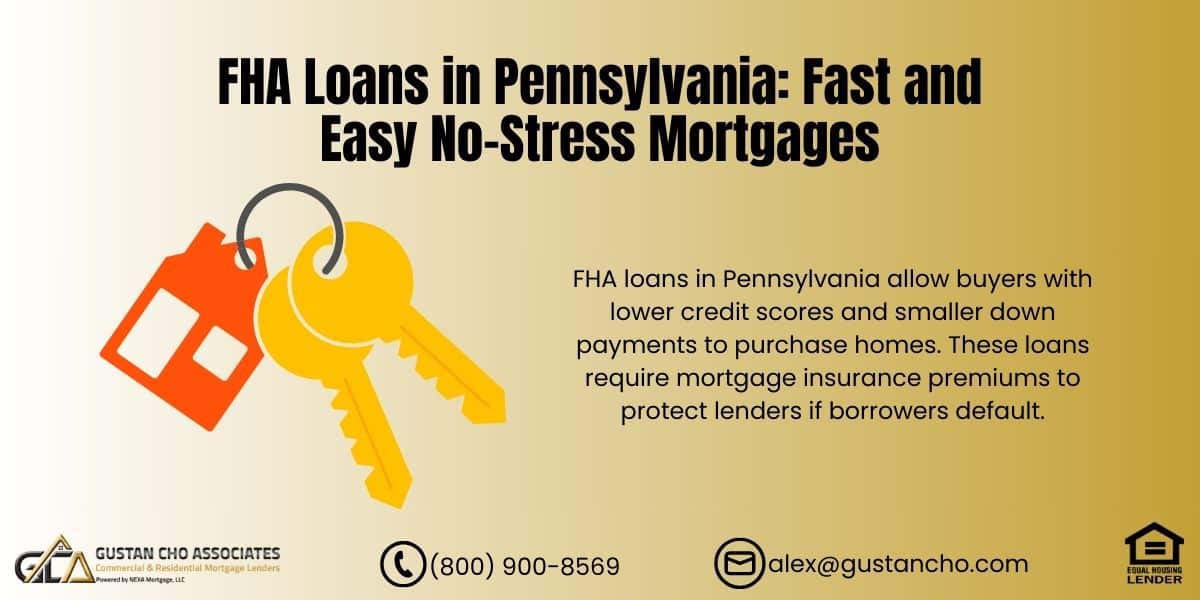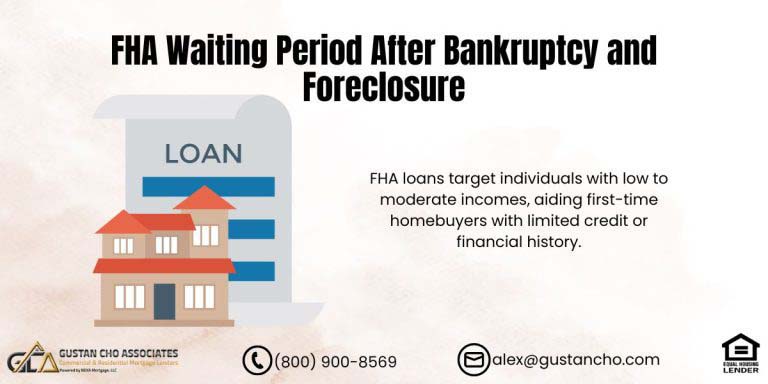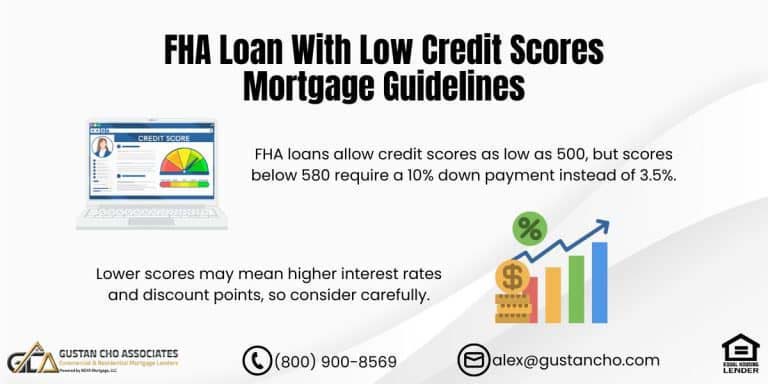For first-time homebuyers in Pennsylvania, homeownership has become more straightforward and achievable. A wide variety of financing options are available, significantly easing the financial burden often associated with buying a home. While the upfront costs of purchasing a house might seem daunting, the security of holding a mortgage makes it both affordable and feasible over time.
There are plenty of options for those navigating these paths. Consider a conventional mortgage, which is well-known for its flexibility. However, FHA loans in Pennsylvania are particularly noteworthy for their accessibility to first-time buyers. This choice is designed to meet your specific requirements by providing more relaxed credit criteria and reduced initial payments.
By exploring these available avenues, securing a home in Pennsylvania is within your reach, making the dream of homeownership a tangible reality for first-timers.
What is an FHA Loan?
Have you ever wondered about FHA loans, especially FHA loans in Pennsylvania? Let’s break it down into simpler terms that we all can understand. Imagine your dream of owning a home, but your bank account and credit score are more like a nightmare. That’s where an FHA loan steps in. It’s like a helpful friend, backed by the Federal Housing Administration (FHA), ready to make your dream a reality.
An FHA loan isn’t just any mortgage. It’s specifically designed for folks who might not have a ton of money saved up or those whose credit scores have seen better days. Picture this: you’ve got a decent job in Pennsylvania, but between paying the bills and life’s little surprises, saving up for a down payment on a house seems impossible. And your credit score? Let’s say it’s not standing ovation-worthy.
That’s where FHA loans in Pennsylvania come into play. FHA-approved lenders offer these loans as a beacon of hope because the FHA has your back, ensuring the loan. This means lenders are more willing to take a chance on you, even if your credit score needs to hit the high notes.
But why is this such good news for aspiring homeowners in Pennsylvania? Getting approved for conventional loans can be tough if your finances are tight or your credit isn’t sparkling. FHA loans, however, are designed with you in mind. They’re a pathway to homeownership for those who thought their dream might remain a dream.
In a nutshell, if you’re in Pennsylvania, looking to own a piece of the American Dream, but your financial history isn’t perfect, an FHA loan might be the solution you’ve been searching for. It’s a chance to open the door to owning a home without having to be perfect on paper. Remember, owning a home is about building a future, and an FHA loan is here to help you lay that first brick.
Ready to Buy a Home in Pennsylvania? Let’s Help You Secure an FHA Loan!
Contact us today to find out how you can qualify for an FHA loan and get started on your homeownership journey.
History of FHA Loans
During the Great Depression in 1934, the U.S. Congress created the Federal Housing Administration to revitalize the housing market. At that time, the housing market was struggling, with foreclosure rates rising and limited financing options. This made homeownership challenging, and most people rented their homes. The introduction of FHA loans transformed the market by reducing the risk for lenders, making it easier for more people to qualify for home loans.
Since then, homeownership in the U.S. has grown significantly, reaching 65.4% in 2021. Today, FHA loans continue to help many first-time homebuyers in Pennsylvania and nationwide.
How Does an FHA Loan Work in Pennsylvania?
FHA loans in Pennsylvania are a fantastic helping hand for folks who dream of owning their first home but find traditional loans out of reach. If your credit score isn’t exactly top-notch or your savings for a hefty down payment are a little short, FHA loans could be the answer to your prayers.
Here’s the lowdown in plain-speaking terms:
- Easy on the Down Payment: With FHA loans, you only need 3.5% if your credit score is 580 or above. That’s a lot gentler on your wallet compared to many conventional loans. And if your credit score is between 500 and 579, you’re not out of options—you’ll just need to bump up that down payment to 10%.
- Say Hello to Mortgage Insurance: There’s a trade-off. Borrowers need to cough up for mortgage insurance premiums. This might seem like a bummer, but it’s actually there for a reason. It’s like a safety net for the lender if things go sideways and the borrower can’t repay the loan.
- It’s All About the Approved Lenders: Here’s a crucial bit—while you’re hunting down FHA loans in Pennsylvania, remember you won’t get the loan straight from the FHA. They’re like the quality control department, ensuring the lenders offering these loans are up to snuff. So, you’ll be dealing with FHA-approved lenders when you apply.
In plain speak, FHA loans in Pennsylvania are a lifeline for first-time buyers who are feeling a bit pinch. Lower down payments and some flexibility with credit scores can make the path to homeownership seem a whole lot less steep.
FHA Loan Requirements in Pennsylvania
In Pennsylvania, if you want to be eligible for an FHA loan, you must satisfy specific criteria:
- Credit Score: An individual must have at least 500 credit score. However, a score of 580 or above is preferable to qualify for a lower down payment.
- Income: Steady income and stable employment history for at least two years with the same employer.
- Down Payment: A minimum of 3.5% of the total cost of the property.
- Property Appraisal: An FHA-approved appraiser must appraise the property.
- Nationality: You must be a U.S. resident with a valid Social Security number.
- Debt-to-Income Ratio: The front-end ratio (housing-related expenses) should be less than 46.9% of your gross income, and the back-end ratio (all debts) should be less than 56.9%.
- Bankruptcy and Foreclosure: You must be at least two years out of Chapter 7 bankruptcy and three years out of foreclosure, though exceptions can be made.
Types of FHA Loans
The FHA offers various loan programs for different needs:
- Home Equity Conversion Mortgage (HECM): For seniors aged 62 and above, allowing them to convert home equity into cash.
- FHA 203(k) Improvement Loan: For homebuyers planning to make repairs or improvements.
- FHA Energy Efficient Mortgage: This is for making energy-efficient upgrades.
- Section 245(a) Loan: For borrowers expecting their income to increase, with payments that start low and increase over time.
- Streamline Refinance: This is for refinancing existing FHA loans with minimal documentation.
- 203(h) Disaster Mortgage: For those in disaster-prone areas, 100% financing is provided for rebuilding or purchasing a new home.
Comparing FHA Loans to Conventional Loans
FHA and conventional loans have numerous distinctions:
- Credit Score: FHA loans have more flexibility when it comes to credit scores. A score of 500 can qualify with a 10% down payment, while conventional loans typically require a minimum score of 620.
- Down Payment: An FHA loan requires a minimum down payment of 3.5%, while conventional loans may require 3% to 20%.
- Mortgage Insurance: FHA loans require both upfront and annual mortgage insurance premiums. Conventional loans require private mortgage insurance (PMI) if the down payment is less than 20%.
- Loan Terms: FHA loans offer 15- or 30-year terms, while conventional loans offer more options, including 10, 15, 20, and 30 years.
How to Apply for FHA Loans in Pennsylvania
Applying for FHA loans in Pennsylvania may feel like stepping into a new chapter full of opportunities, but it also comes with its own set of tasks you’ll need to tackle to make it a smooth journey. Here’s a closer look at how you can go about it, broken down into simpler, everyday terms. It’s like piecing together a puzzle, but once you’ve got all the pieces, the picture of homeownership starts to come into clear view.
Finding Your Guide, aka an FHA-Approved Lender
Imagine you’re planning a trip through uncharted territory. You’ll want a guide who knows the landscape, right? The same goes for diving into FHA loans in Pennsylvania. Begin by searching for your ideal travel companion in this journey – an FHA-approved lender. These folks have the green light from the Federal Housing Administration to offer you a loan. Don’t just settle for the first one you chat with. Think of it like shopping – you wouldn’t buy the first thing you see without checking out a few other stores, right? So, compare offers from a few lenders to snag the best rates.
Looking to Buy a Home in Pennsylvania? FHA Loans Can Make It Easier!
Reach out now to explore your FHA loan options and get pre-approved today.
Gathering Your Gear, aka Your Documents
When setting off on any expedition, you’ve got to pack. For the FHA loan application journey, your backpack should include:
- A valid ID (proving you are who you say you are).
- Your Social Security number.
- Statements showing off your assets.
- The last couple of years of tax returns.
- Recent pay stubs.
These documents prove to the lender that you’re ready and able to undertake this homeownership adventure.
Setting Your Sights, aka Setting a Budget
Before you start, you need to know your limits – how much can you comfortably afford without stretching yourself too thin? This is where a mortgage calculator becomes your best friend. It’ll help you crunch the numbers to determine what monthly payment fits your budget. Just like you wouldn’t plan a trip without knowing how much you can spend, you shouldn’t jump into house hunting without a clear budget.
Exploring Your Options, aka Comparing Offers
Now that you’ve got all your ducks in a row, it’s time to see what’s out there. This step is all about window shopping – but for loans, not clothes or gadgets. Contact different lenders to see who can offer you the best deal on FHA loans in Pennsylvania. Think of each offer like a travel package; some might include better perks, lower rates, or more flexible payment plans than others. It’s all about finding the perfect match for your situation.
Remember, the journey to securing FHA loans in Pennsylvania might feel daunting at first. But by breaking it down into these steps, it becomes much more manageable. Happy house hunting!
Pros and Cons of FHA Loans
Pros:
- Lower Credit Score Requirements: Allows borrowers with lower scores to qualify.
- Lower Down Payment: As low as 3.5% for those with higher credit scores.
- Flexible Terms: Various loan options to fit different needs.
Cons:
- Mortgage Insurance: Required for the life of the loan if the down payment is less than 10%.
- Property Requirements: Must meet FHA standards and be used as a primary residence.
- Higher Costs: FHA loans’ annual percentage rate (APR) can be higher than that of conventional loans.
Tips for Qualifying for FHA Loans in Pennsylvania
- Check Your Credit Report: Ensure there are no errors and work on improving your score if needed.
- Save for a Down Payment: Increasing the initial payment can lower the interest rate and the monthly amount you have to pay.
- Pay Off Debt: Lowering your debt-to-income ratio can improve your chances of approval.
- First-Time Homebuyer Programs: Look for programs that offer down payment assistance and other benefits.
FHA Loan Limits in 2024
The FHA loan limits were updated in 2024, reflecting changes in the housing market and accommodating buyers’ needs across different areas. Whether you’re eyeing a cozy single-family home, considering a duplex to live in one unit and rent out the other, or even pondering the purchase of a triplex or fourplex as an investment property, understanding these limits can help guide your buying journey.
Single-Family Home
For those looking at single-family homes, the FHA has set a limit of $472,030 in areas where housing costs are lower. However, if you’re aiming for a home in a high-cost area, the ceiling jumps to $1,089,300. This selection guarantees a broad range of residences, and requirements, whether buying your first property or relocating to a different region, are addressed.
Duplex
If a duplex is more your style, perhaps with thoughts of renting out the second unit, know that the FHA loan limit starts at $604,400 in more affordable regions. In places where real estate prices soar, this limit climbs to $1,394,775, offering flexibility and options for potential landlords or multigenerational families.
Triplex
The figures adjust accordingly for those considering the purchase of a triplex. In lower-cost areas, the FHA loan limit is $730,525, expanding to $1,685,850 in higher-cost locales. This can be an attractive choice for purchasers who want to accommodate larger families or explore real estate investment.
Fourplex
Lastly, for investors or families needing the most space and potential rental income, fourplexes have a set FHA loan limit of $907,500 in the most affordable regions, with high-cost areas seeing a limit of $2,095,200. Such figures indicate the FHA’s flexibility and adaptability in accommodating various housing needs and markets.
In summary, FHA loans in Pennsylvania and across the country are designed to make homeownership more accessible. Loan limits vary by property type and location to reflect local real estate market conditions. Whether buying your first home or investing in a multi-unit property, knowing these limits for 2024 can help you navigate your options and plan your purchase effectively.
Thinking About Buying a Home in Pennsylvania? FHA Loans Make It More Affordable!
Reach out today to discuss your eligibility and get started on your home loan.
Is an FHA Loan Right for You?
FHA loans in Pennsylvania offer a viable path to homeownership for many first-time buyers in Pennsylvania. With flexible requirements and lower down payments, they provide opportunities for those who might otherwise struggle to secure a mortgage. By understanding the benefits and requirements, you can make an informed decision and take the next step toward owning your dream home.
For more information or to apply for an FHA loan in Pennsylvania, visit Gustan Cho Associates Mortgage Group. Our team is here to help you navigate the process and find the best mortgage solution.
FAQs – No-Stress Mortgages: Fast and Easy FHA Loans in Pennsylvania
- 1. What is an FHA loan? An FHA loan is a mortgage backed by the Federal Housing Administration. It assists individuals with lower credit scores and low to moderate incomes in purchasing homes with smaller down payments.
- 2. How do FHA loans in Pennsylvania work? FHA loans in Pennsylvania allow buyers with lower credit scores and smaller down payments to purchase homes. These loans require mortgage insurance premiums to protect lenders if borrowers default.
- 3. Who can qualify for an FHA loan in Pennsylvania? Individuals who have a credit score of at least 500, a steady income, and residency in the United States are eligible. A credit score of 580 or more enables a reduced down payment of 3.5%.
- 4. What are the down payment requirements for FHA loans in Pennsylvania? For credit scores of 580 and above, the down payment is 3.5%. You must provide a 10% down payment if your scredit score ranges from 500-579.
- 5. Can I get an FHA loan with bad credit in Pennsylvania? Yes, FHA loans in Pennsylvania are designed for those with lower credit scores. A score of 500 can qualify with a 10% down payment, while 580 and above qualify with 3.5%.
- 6. What types of FHA loans are available in Pennsylvania? There are several types, including the standard FHA loan, FHA 203(k) Improvement Loan, FHA Energy Efficient Mortgage, and more, each catering to different needs.
- 7. How does mortgage insurance work for FHA loans in Pennsylvania? Borrowers need to pay an initial mortgage insurance premium as well as yearly premiums, which are divided into monthly payments, to protect lenders in case the borrower defaults on the loan.
- 8. Are there any income limits for FHA loans in Pennsylvania? No specific income limits exist, but borrowers must show steady income and employment history to qualify.
- 9. What properties qualify for FHA loans in Pennsylvania? The property must be appraised by an FHA-approved appraiser, meet specific safety standards, and be used as a primary residence.
- 10. How do I apply for an FHA loan in Pennsylvania? Find an FHA-approved lender, gather necessary documents (ID, Social Security number, asset statements, tax returns, pay stubs), set a budget, and compare offers from multiple lenders to find the best deal.
If you have any questions about FHA Loans in Pennsylvania, please contact us at 800-900-8569. Text us for a faster response. Or email us at alex@gustancho.com. The team at Gustan Cho Associates is available 7 days a week, on evenings, weekends, and holidays.
This blog about No-Stress Mortgages: Fast and Easy FHA Loans in Pennsylvania was updated on August 7th, 2024.
Ready to Buy Your Dream Home in Pennsylvania? Let’s Secure Your FHA Loan!
Contact us now to find out how you can qualify for an FHA loan in Pennsylvania.










